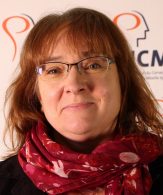 Delphine BOHL
Principal Investigator, PhD, CR1, INSERM
Team “ALS : causes and mechanisms of motor neuron degeneration“
https://institutducerveau-icm.org/fr/team/equipe-boillee-sla/
Delphine BOHL
Principal Investigator, PhD, CR1, INSERM
Team “ALS : causes and mechanisms of motor neuron degeneration“
https://institutducerveau-icm.org/fr/team/equipe-boillee-sla/
Biography
After my studies at the Universities of Paris 6 and Paris 7, I prepared a thesis in the field of gene therapy, at the Pasteur Institute, under the supervision of Dr. Jean-Michel Heard. I have passed my thesis in 1997, then I joined INSERM in 1998 as a Research Associate. I started working on stem cells in the 2000s, and then I focused on the theme I am currently working on: the modeling of central nervous system diseases using human induced pluripotent stem cells, called iPSC. I developed iPSC models to study San Filippo lysosomal disease type B and then I dedicated my work to Charcot disease or Amyotrophic Lateral Sclerosis. I joined Dr Boillée's team in 2014 and I continue my work in a team whose research theme is focused on ALS. Since 2014, I am also the scientific leader of the platform dedicated to the generation of iPSCs and their genetic modifications by the CRISPR/CAS9 approach.
Research work
My work aims to study the mechanisms leading to motor neuron degeneration and death in Amyotrophic Lateral Sclerosis (ALS) using iPSC models. ALS is a heterogeneous disease under different aspects (genetic, clinical). Currently, the mechanisms of the disease are still poorly understood and there is no cure, while the disease is fatal in 2 to 5 years after diagnosis. We have thus constituted a bank of iPSCs from patients with different forms of ALS as well as iPSCs from isogenic or non-isogenic controls. These iPSCs are generated from fibroblasts donated by patients in a very well established regulatory framework. We then developed protocols to differentiate these iPSCs into motor neurons, as well as inflammation cells, macrophages and microglial cells. Our studies aim to compare each of these cell types and to identify differences between patients and controls. These differences are then used as tests to analyze the therapeutic potential of molecules and in particular a molecule of therapeutic interest in collaboration with a start-up. On the other hand, we are studying the interactions between motor neurons and microglial cells or macrophages, in order to find altered pathways that could then be modulated to slow down the progression of the disease in patients.Publications
- Bréjot T, Blanchard S, Hocquemiller M, Haase G, Liu S, Nosjean A, Heard JM, Bohl D. Forced expression of the motor neuron determinant HB9 in neural stem cells affects neurogenesis. Exp Neurol. 2006 Mar;198(1):167-82. Epub 2006 Jan 24. PMID:16434037
- Bohl D, Liu S, Hocquemiller M, Blanchard S, Haase G, Heard JM. Directed evolution of motor neurons from genetically engineered neural precursors. Stem Cells. 2008. Oct;26(10):2564-75. doi: 10.1634/stemcells.2008-0371. Epub 2008 Jul 17.PMID:18635866
- Lemonnier T., Blanchard S., Toli D., Roy E., Bigou S., Froissart R., Rouvet I., Vitry S., Heard JM., Bohl D. Modeling neuronal defects associated with a lysosomal disorder using patient-derived induced pluripotent stem cells. Hum Mol Genet. 2011 Sep 15;20(18):3653-66. doi: 10.1093/hmg/ddr285. Epub 2011 Jun 17. PMID:21685203
- Toli D, Buttigieg D, Blanchard S, Lemonnier T, Lamotte d’Incamps B, Bellouze S, Baillat G, Bohl D*, Haase G*. Modeling amyotrophic lateral sclerosis in pure human iPSc-derived motor neurons isolated by a novel FACS double selection technique. Neurobiol Dis. 2015 Oct;82:269-280. doi: 10.1016/j.nbd.2015.06.011. Epub 2015 Jun 21. *Co-authors. PMID:26107889
- Chiot A, Zaïdi S, Iltis C, Ribon M, Berriat F, Schiaffino L, Jolly A, de la Grange P, Mallat M, Bohl D, Millecamps S, Seilhean D, Lobsiger CS, Boillée S. Modifying macrophages at the periphery has the capacity to change microglial reactivity and to extend ALS survival. Nat Neurosci 2020 Nov;23(11):1339-1351.doi: 10.1038/s41593-020-00718-z. Epub 2020 Oct 19


